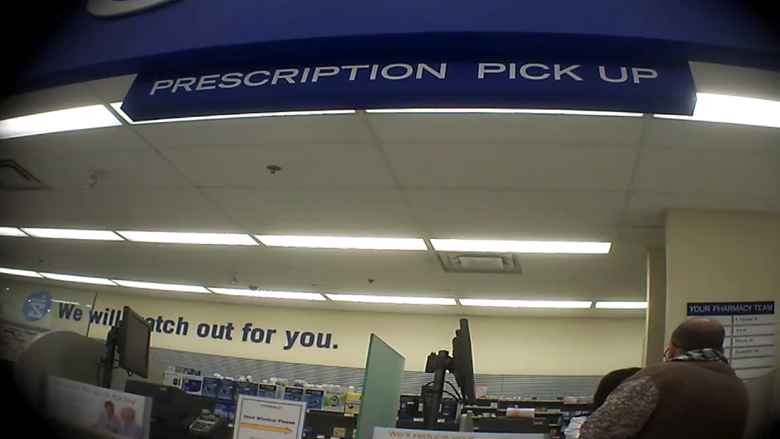Pharmacists say corporate pressure can lead to prescription mistakes
Some Canadian pharmacists are saying they are under intense pressure to meet business quotas, which causes an assembly-line mentality that increases the likelihood of making mistakes.
Several pharmacists are speaking out as part of a months-long investigation by CBC News and Marketplace looking at pharmacy errors across the country.
EarIier this week, Marketplace revealed that many pharmacists may not be conducting important screening required to keep Canadians safe from dangerous drug interactions.
Some pharmacists say the pressure to meet profit targets can compromise the quality of the care and attention they’re able to dispense.
CBC agreed to protect the identity of the pharmacists who spoke out and fear industry reprisal.
“You know it comes down to metrics and bottom lines, as margins shrink,” one pharmacist told Marketplace co-host Erica Johnson.
“You keep hearing, ‘Doing more with less, doing more with less.’ And it's not sparing the health care profession at all,” he said. “It's every pharmacist’s worst nightmare.”
The Marketplace investigation, Dispensing Danger, airs Friday, Jan. 23 at 8 p.m. (8:30 p.m. NT) on CBC Television and online.
‘At some point you just reach your limit’
Every year, close to 38,000 pharmacists dispense more than half a billion prescriptions in Canada. There are no statistics on how often errors occur, and little mandatory reporting of mistakes.
Marketplace spoke with several pharmacists who describe a corporate environment where pressure to meet business targets makes errors more likely.
Pharmacists described targets that include corporate quotas for prescriptions filled per day and productivity targets that include labour hours per prescription dispensed.
Pharmacy insiders say they are also under pressure to push services such as flu shots and medical checks, services that can mean increased revenue for pharmacies.
“It comes down to transactions, yet again. ‘How many can I get through in an hour?’ To do it quickly? You know, you just go, go, go,” one pharmacist said.
“As a pharmacist, you just get frustrated.”
When they don’t achieve those targets, some feel it can invite corporate scrutiny, change staffing levels and ultimately affect their jobs, meaning there’s less support behind the pharmacy counter.
“If you’re messing around with labour to achieve a financial goal, then you’re doing things faster; you’re cutting corners,” another pharmacist said.
“You might be a great pharmacist at a slower speed and everyone has a breaking point. You keep dialing that up, at some point, you just reach your limit,” he said.
He acknowledges that he has made errors, but adds that “you only know about the ones you know about. What scares me more is the ones I don’t know about.”
The corporate pressure to perform can mean balancing business pressure and professional responsibilities can get “blurred,” he says. Because of the pace, he says that he often feels he’s operating on “automatic pilot.”
Marketplace requested an interview with the Neighbourhood Pharmacy Association of Canada (NPAC), which represents most pharmacies across the country.
The group declined to speak on camera, but issued a statement that said: “Patient health and safety is our top priority. Pharmacy in Canada works hard every day to earn the trust and promote the health and well-being of Canadians.”
NPAC didn’t address the use of targets or the effect they have on pharmacy practice.
Error stories pour in to CBC
Since news of the Marketplace investigation first aired, stories have been pouring in from Canadians about their experiences with pharmacy errors. Some say they were dispensed the wrong drug or the wrong dose; others complain that they were never made aware of drug interactions.
Debbie McDonald from South Surrey, B.C. is alarmed at how a pharmacy error could have affected her family.
Earlier this week, she picked up an acne medication -- Accutane -- for her 18-year-old son, Kevin. After hearing about the Marketplace investigation, Kevin looked up the drug by doing a web search for the number printed on the pills.
While the bottle was labeled correctly, the pills inside were actually Accupril.
McDonald was alarmed. “Thank goodness I know [that] medication is for high blood pressure,” she said.
“If I had been someone else, I might have told him, ‘Well, it’s probably the same.’”
She doesn’t want to think about what would happen if Kevin, who studies aviation at the University of Fraser Valley and often flies solo, had taken the Accupril pills.
Pharmacists also wrote in about their concerns about why errors happen.
“I have worked for independent, grocery and chain pharmacies,” one pharmacist wrote. “The bottom line is always the same, regardless of how the employer frames it. Work as fast as you can, do not take meal breaks, forget about being able to relieve your bladder.
“It is a ridiculous situation that we are placed in. If your blood sugar level drops so low that you cannot function, is it any wonder that errors are made?
“We are supposed to be health care providers, but are expected in many workplaces to put our own health and well-being to one side in order to make more money for our employers.”
Have you experienced a pharmacy error? Marketplace wants to hear from you. Email marketplace@cbc.ca




